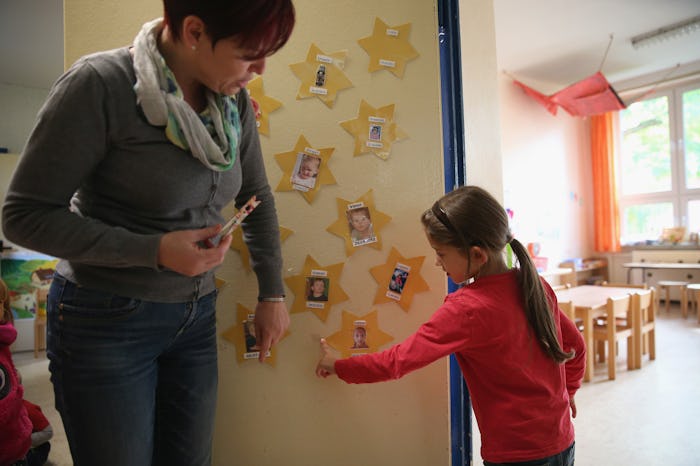Life

Parents Aren't The Only Ones Split On Common Core
As most parents, students, teachers, and administrators are aware, the Common Core curriculum is a highly controversial issue in the public school system today. Common Core, which was created and implemented in 2010, describes its standards as being "designed to ensure that students graduating from high school are prepared to take credit bearing introductory courses in two- or four-year college programs or enter the workforce." Of course, what these standards mean for education tools up until high school and beyond is what many teachers and parents take issue with. Since its formation, the Common Core Standards have been moderately approved of by teachers, however, the latest polls about whether teachers support the Common Core show that not all educators are on board with the stringent standards.
Many critics of the Common Core argue that the curriculum is far too broad and is anchored by political, bureaucratic interests rather than what is best for the child. The Core also has an exacting definition of what Language Arts should include and gets rid of a lot of literature, poetry, and creative writing — subjects that, according to experts, encourage critical thinking, an important life skill. And while, of course, private schools are exempt from the Common Core and its adoption, not all parents can afford that choice.
In fact, according to a recent poll conducted by the organization "Education Next," only 40 percent of teachers agree with Common Core and approve of its implementation. Furthermore, teachers and parents alike said that the negative effects of the Common Core outweigh any possible positive ones.
While opinions of Common Core have definitely shifted since its creation, the fact is that this latest shift in opinion is perhaps the most concerning, since teachers — the people who actually see the direct consequences of Common Core — are among the respondents who strongly oppose it.
While many have criticized Common Core online, and shared photos of worksheets students are expected to complete, one of the most unpopular CC qualities is that of mathematics.
For example, the following is an excerpt from the Common Core curriculum expectations in mathematics website — and clearly, it's understandable why many are frustrated or concerned:
By paying attention to the calculation of slope as they repeatedly check whether points are on the line through (1, 2) with slope 3, middle school students might abstract the equation (y - 2)/(x - 1) = 3. Noticing the regularity in the way terms cancel when expanding (x - 1)(x + 1), (x - 1)(x2 + x + 1), and (x - 1)(x3 + x2 + x + 1) might lead them to the general formula for the sum of a geometric series.
To be sure, what matters most is whether children can understand how to come to an answer using logical methods, and if a teacher and student are comfortable using that method, that's what matters. But with opposition to Common Core growing among educators, it may be time to take another look at the system and see what needs fixing.